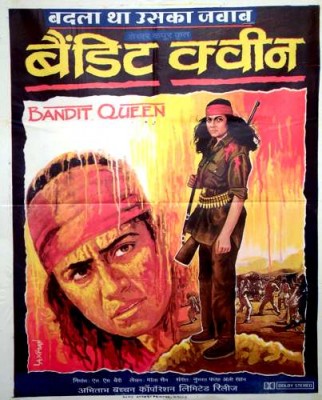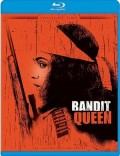| Reviews & Columns |
|
Reviews DVD TV on DVD Blu-ray 4K UHD International DVDs In Theaters Reviews by Studio Video Games Features Collector Series DVDs Easter Egg Database Interviews DVD Talk Radio Feature Articles Columns Anime Talk DVD Savant Horror DVDs The M.O.D. Squad Art House HD Talk Silent DVD
|
DVD Talk Forum |
|
|
| Resources |
|
DVD Price Search Customer Service #'s RCE Info Links |
|
Columns
|
|
|
Bandit Queen
Regardless of details the picture might have gotten wrong about Devi's life, Bandit Queen is nonetheless gripping in the manner in which it exposes India's brutal inhumanity toward its lower caste peoples, in particular its unpardonable treatment of women and even small girls.
It's not an easy film to watch. It depicts child slavery, forced marriages, pedophilia, and cruel class prejudice in just its first ten minutes, followed by gang rape, custodial rape, misogyny, humiliation, degradation, assassination, political corruption, unethical medical care, and mass murder. What would be unbearable is offset somewhat by Devi's story, that of a woman who adamantly refuses to break, and ultimately takes control over her own, seemingly predetermined fate.
Twilight Time's Blu-ray offers a good transfer with excellent 2.0 DTS-HD MA surround sound, as well as a couple of good extra features.
Born into the lower-ranked Mallah caste, Phoolan (Sunita Bhatt), about five years old*, is sold by her father (Ram Charan Nirmalker) to a 20-something, higher-ranked Thakur, Puttilal (Aditya Shrivastava). Torn from her family, she essentially becomes her husband's slave, fetching water and tending to his family's goats. At night Puttilal rapes her and she flees back home, which only brings shame to her family.
As an adult, Thukur men continually subject Phoolan (now played by Seema Biswas) to sexual harassment. When one unsuccessfully attempts to rape her, he accuses her of trying to seduce and blackmail him, i.e., she was "asking for it." As the village government is run by Thukurs (mostly men in her husband's family at that), the trial is a joke and Phoolan is banished from the village.
She goes to live with her fat, bald but understanding cousin, Kailash (Saurabh Shukla), but eventually his wife kicks Phoolan out of their home. With nowhere else to turn, she joins a hoard of dakus (bandits) hiding out in the hinterlands, the Thukur-controlled Babu Gujjar (Anirudh Agarwal) gang. He's currently in jail, so the gang has been entrusted to a colossal Thukur who resembles the late Richard Kiel. He rapes her repeatedly, until his Mallah lieutenant, Vikram (Nirmal Pandey) becomes so offended by his leader's savagery that Vikram shoots him dead and takes over.
Under Vikram's leadership, Phoolan becomes a crack bandit. Further, Vikram regards her as an equal, desiring to win rather than command her respect and, virtually alone among all the men seen in the film, treats her with kindness. However, Gujjar is released from prison and savagely reasserts his Thukur authority over the Mallah Vikram and Phoolan.
Written by Ranjit Kapoor and Mala Sen and directed by Shekhar Kapur (Masoon, Elizabeth), the film does not attempt to justify Phoolan's revenge killings, confined mostly to the film's last third, including the mass murder of Thukur men. And despite Phoolan's popular image among the Mallah as a kind of Indian Robin Hood, she herself is never actively portrayed as stealing from the rich and giving to poor, as it were. Rather, the movie seems to suggest Phoolan became a notorious bandit for no reason other than, given the choice between slavery, rape, and humiliation versus life as a criminal, she choose the latter.
Instead, Bandit Queen mostly serves as a scathing indictment of Indian society, one that still embraces unimaginable sexism and brutality against even innocent little girls, and a caste system out of the Dark Ages, completely out of step with the emerging, 20th century India. And, defiantly, the beat goes on. After spending 11 years in prison, awaiting trial, Phoolan was released and the government withdrew its 48 criminal charges, including murder. Popular among the Mallah, Phoolan was elected to parliament in 1996, but was assassinated in 2001 by three masked Thukurs apparently hired by one Sher Singh Rana, a revenge killing. The 2012 Delhi gang rape and fatal assault of a 23-year-old physiotherapy intern further underscored India's epidemical violence toward women.
So where does this violence spring from? Prologue text points to a something on everyone's mind in 2015: religious extremism. Bandit Queen's prologue quotes Hindu's sacred text, the Manu Smriti, "Animals, drums, illiterates, low castes, and women are worthy of being beaten."
Video & Audio
Other than a few frames of strange digital glitches, Bandit Queen looks good in high-def, the 1080p 1.78:1 transfer pleasingly film-like with its light great, sharp image, good color and contrast. Even more impressive is the 2.0 DTS-HD Master Audio (mostly in Hindi, with English subtitles), which uses the surround changes and front directionality very well.
Extra Features
Supplements include an isolated score track, featuring Nusrat Fateh Alikhan's evocative, haunting music; an audio commentary with director Kapur; and a good booklet essay by Julie Kirgo.
Parting Thoughts
Hard to sit through but impressively unflinching in its bitter political stance, Bandit Queen is compelling, informative, and persuasive filmmaking. Highly Recommended.
* The movie opens in 1968, when Phoolan was five, and the child actress in the movie also looks five. However, in real-life, Phoolan was reportedly married off at age 11, which is the age given the girl in some synopses and reviews.
Stuart Galbraith IV is the Kyoto-based film historian and publisher-editor of World Cinema Paradise. His credits include film history books, DVD and Blu-ray audio commentaries and special features.
|
| Popular Reviews |
| Sponsored Links |
|
|
| Sponsored Links |
|
|
| Release List | Reviews | Shop | Newsletter | Forum | DVD Giveaways | Blu-Ray | Advertise |
|
Copyright 2024 DVDTalk.com All Rights Reserved. Legal Info, Privacy Policy, Terms of Use,
Manage Preferences,
Your Privacy Choices | |||||||













